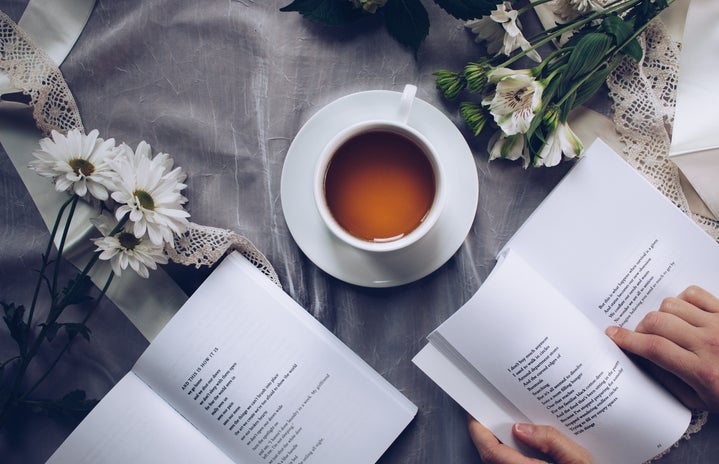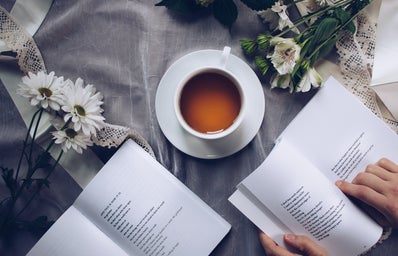One part orange juice, one part black tea. The juice of half of a Meyer lemon (freshly squeezed, if possible). One tablespoon of olive oil. A pinch of cayenne. Anything else that makes you feel well. Magic Tea, as my old vocal coach called it, is not as bad as it sounds. It’s what you drink when you’re an actor and you have a sore throat. You drink it when your sinuses are blocked or when you’re really sore from the high kicks you did the night before and you want to soothe the pain. Or maybe you drink it when your breaths are shaky, when you’re anxious, or when you just don’t want to go on stage. You drink it when you lose your voice on the opening night of your last show before college where, for the first time, you finally have the lead role, and you stand there, on stage, unable to sing or speak the way you have practiced for the past five months, six days a week, in a dusty rehearsal room you hate the smell of, where you slowly began to realize that you don’t want to be an actor anymore, that you have wasted the past eight years of your life on training, and maybe you shouldn’t have auditioned for that production of “Wizard of Oz” in the 6th grade and decided that you wanted to be an actor in the first place because look where it got you now. You drink it when you want to feel well.
I used to drink Magic Tea before almost every performance, for one reason or another. In fact, I’m sure I had at least five cups of it before opening night, but it didn’t help; it didn’t give me my voice back. It’s a strange feeling, playing an overly exuberant character when all you want to do is cry. I didn’t though, not on stage at least. That’s not to say that I didn’t skip the cast parties and leave as soon as I could once the performance was over. As I drove home, I called my old vocal coach and she told me that being unwell was “of the will of the mind,” and that I hadn’t drunk enough Magic Tea. I convinced myself that it was my fault that my voice had given out.
When I got home, I remember sitting on the floor of my upstairs bathroom with my head in my hands, shielding my tearful eyes from my parents who lingered just outside of the doorway. My mom asked if I wanted to go to the doctor’s, and when I didn’t respond, she asked if I wanted to go to therapy. Because you won’t talk to us, she said. I don’t know if she was trying to get me to open up or trying to make a cruel joke about me having lost my voice. I don’t know, I didn’t care. I just shuffled past them into my room and slammed my door.
I think I laid in bed for a solid four hours that night, crying and feeling far from well. Then at 3 AM–between stifled sobs and offhanded comments about the worthlessness of my immune system–I made a decision that was equal parts fantastic and stupid; I decided to write. The decision to write was fantastic, as writing has always been my therapy. There’s a sense of comfort that comes from converting the rampant inner thoughts of my conscience into paragraphs, and that’s exactly what I needed at that moment. What I decided to write, however, was my common application essay; that was stupid.
It wasn’t stupid in the sense that the essay was a mess of incoherent jumbles or that it had no relation to any of the prompts–I’m actually quite proud of its cohesion and clarity. It was stupid because all I felt when writing that essay was anger. Anger, and the humiliation that came with not wanting to return to work the next day. The beating of my heart in my chest caused by the incoming text messages from my castmates asking if I was feeling well or if I had vocal nodes. The unrealistic fear of my career in theatre being thrown down the drain because of one night. The realization that I didn’t even want to have a career in theatre anymore. That’s what makes that essay so stupid because that’s not what that essay was about at all.
I lied in that essay. Not intentionally, of course, but the inner workings of my mind somehow created this heartwarming narrative of immense growth and sickly sweet gratitude towards an instance and an industry that caused me so much pain. It was a tall tale, really. A part of me was just too subconsciously uncomfortable with displaying a level of vulnerability in my writing in which I could flat out state that I had been wildly unhappy with my job for the past eight years. Instead, I produced a mildly insightful, yet shallow piece of weak personal consolation which, ironically, is titled “A Love Letter to Theatre.” It was a hard realization to come to, but through this self-reflection, I have not only been able to come to terms with my feelings regarding my time on stage, but also identify the incredible impact that performing has had on my life, I wrote in the introductory paragraph. It’s a bittersweet conclusion, but the amount of growth I have achieved through falling out of love with theatre is invaluable. Bullshit. The essay continues on like this in its entirety, riddled with meaningless reassurances and unnotable self-discovery. In no particular order, theatre has taught me how to communicate, how to express, how to support, and how to lead, all of which will benefit me greatly in a college setting and in life. With this in mind, theatre may have been the greatest teacher of them all.
I phrased everything in a way that portrayed it as the most crucial of life lessons: a breakup with a significant other in which I learned more about myself than I could have ever imagined. I hadn’t just “broken up” with theatre though, I had come to realize the sheer torment and unhappiness that I had associated with being on stage and the shame I felt knowing that my body could fail me. By sugar-coating my experience and organizing it to feign passionate appreciation, I didn’t allow myself time to be angry. How much more healing could I have done by now if I allowed myself time to be angry?
If I’m being honest, I still don’t know how I feel. I certainly haven’t been able to come to terms with my feelings regarding my time on stage yet, but I’m not angry anymore: at myself or my body. I sure as hell haven’t been able to identify the incredible impact that performing has had on my life, but I still drink Magic Tea sometimes. I don’t know how much growth I have achieved through falling out of love with theatre, but nonetheless, I feel better. I feel well.
❦
I used to prepare my tea with just a drizzle of honey. Sometimes I would add a few drops of lemon juice if I had any, but I would often forget to buy it. The recipe never really mattered to me, mainly because I wasn’t drinking tea for any of its health-related benefits. The phlegm-clearing effects of lemon juice never crossed my mind while I stirred it into steaming cups of chamomile, nor did I ever explicitly think about the antibacterial properties of lightly-ambered honey while pulling the honey bear bottle from my cupboard. Tea was never anything more than a delightful drink and a reminder of home, and I found comfort in knowing that a simple cup of sweet ginger or chai, delicately enriched with the notes of my own kitchen, could make me so happy.
Happiness and wellness are often interchangeable terms in the consumerized world of well-being, but I never thought of tea as something that made me well. It was more of a solace, rather, an emotional consolation that grounded me. It’s what I would drink with my mom when we had the time to sit down in the sunroom to enjoy breakfast together. I would drink it with my dad when we lounged on the sofa during his evenings off or when we watched football games on Monday nights. Or maybe I would drink it when I grew tired of the lime water I used to make, when the cold of a Minnesota winter had rouged my cheeks to the color of strawberry jam, or when all I wanted was to calm my mind after a long day in the city. In those first few years that I was working in the theatre industry, I would drink it to reward myself after a performance.
Although not a daily ordeal, I would make an effort to have a cup of tea every now and then. Green teas and steeped hibiscus variants, herbal cardamon apple blends and those seasoned cinnamon teas that coat the roof of your mouth with a sugary, spiced warmth. Once I began taking vocal lessons, however, I was discouraged from drinking such teas. My old vocal coach told me to stick to black tea because it was straightforward and simple: that if I was going to drink tea, I might as well drink it for the right reasons. It was then that she introduced me to Magic Tea as if it were liquid gold: a hallowed recipe written on the walls of an ancient salt cave that she had miraculously discovered.
It’s one part orange juice, one part black tea. The juice of half of a Meyer lemon, she said.
I have lemon juice at home.
It should be freshly squeezed, Sara. Fresh lemon juice has raw antioxidants that can cure ailments and cleanse the body and mind.
Ok.
One part orange juice, one part black tea. The juice of half of a Meyer lemon, freshly squeezed, if possible. One tablespoon of olive oil. A pinch of cayenne. Anything else that makes you feel well.
Ok.
I will write it down for you.
My vocal coach wrote the recipe down on the last page of her blue and pink trimmed notepad, a page that is still stuck to my fridge with a magnet shaped like a koala. I remember glancing down at it multiple times as I drove home from her house that night, anticipating what this mysterious tonic could do for me. Just the name “Magic Tea” makes it sound exciting. Despite its rather undelectable-seeming combination of ingredients, I couldn’t wait to make it for the first time; I felt as if I had been told a secret that no one else knew.
From that moment on, tea was not something to be enjoyed. It was a defense mechanism, an elixir of strength, just another facet of an ever-growing wellness routine. I could no longer settle for a drizzle of honey and a few drops of lemon juice, as I was seemingly bound to a strange concoction of juices and spices–and what seemed to be the entire contents of my pantry–boiling on my stovetop in a copper saucepan. The first few times I made Magic Tea, I couldn’t help but imagine the witches from the fairy tales I read when I was younger: how they would stand over bubbling cauldrons, following bizarre recipes to brew the most mystical of potions. In my mind, Magic Tea was my potion: a potion of health and vitality and wellness, and there is no doubt about it, Magic Tea made me feel well for a long time.
Within months, I went from drinking it once a week to drinking nearly four cups a day, and with every sip, I felt more powerful and in charge of my well-being; invincible, yet at the mercy of my own mind. I was working harder than I’d ever worked before: auditioning for more projects than I could handle, pulling myself out of injury-related hiatuses prematurely, and dedicating all of my time to training. Before I knew it, I no longer had the time to sit down with my mom and enjoy breakfast, and the evenings my dad had off, I didn’t. I was instructed by my old vocal coach to never drink lime water because the acids in limes were strong enough to harm my vocal cords, or something. I never spent considerable time outside during the winter anymore because it was supposedly bad for my lungs, and why would I ever need to take the time to calm my mind if performing is supposed to be immensely therapeutic? Everything I had previously associated with my day-to-day happiness had slipped away, yet I thought I was more well than I had ever been. When was I going to realize that I was becoming both unwell and unhappy?
I started to think of my downfalls–my injuries, my anxieties, my lack of time–as just twists and turns on my path that were destined to happen. Just drink more Magic Tea. I never imagined myself getting to the point where my voice would abandon me and my body would cry for me to remain still, culminating in me sobbing on my bathroom floor and vowing to throw away everything I had worked for. I thought I would be going to school for theatre, not tearfully writing my common application essay about how my relationship with it was traumatic, yet invaluable. And I thought I would still be on stage to this day, not working on a freshman term paper about how, for the longest time, I had set aside my well-being. I wish I could tell myself to just drink more Magic Tea, but it’s not that simple anymore. It was never that simple; tea can’t cure unhappiness.
❦
And I was unhappy. I knew that I had lost myself. It took me a while to realize that I was unwell. In letting go of the dreams that others have for me, I am healing. These years that I struggled to maintain my relationship with theatre hare what made me unwell. I have learned to appreciate my own well-being, and with this, I have taken the time to identify exactly what theatre has made me realize. In no particular order, the theatre has made me realize that I missed spending time with parents, I missed lime water, I missed being happy, and I missed not having to mix anything more than a drizzle of honey into my tea. With this in mind, how did I ever let myself get so unwell?


